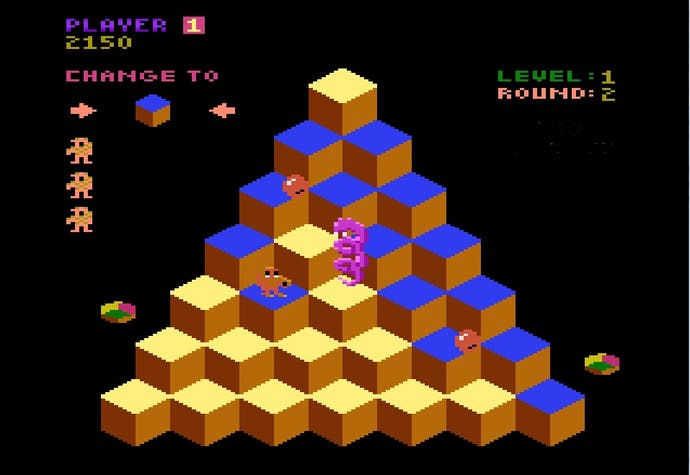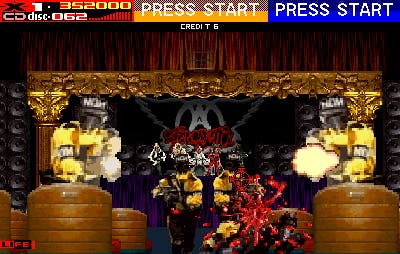Setting the stage: the actor who made an arcade classic
Before Warren Davis became a Hollywood actor he created Q*Bert.
The last step of minting the 1982 arcade classic Q*Bert was the name. The developer, Warren Davis, had the pyramid, the character, the springs and fluffy foes all programmed. All it needed was a title. So Davis and his colleagues at Gottlieb Amusement sat around a room tossing out potential names.
"Hubert", someone bravely put forward on a whiteboard.
Another Gottlieb employee erased the H and replaced it with a C. "Cubert". Given the game's stages set on a pyramid of cubes, the team knew they were onto something here.
Inspired by this train of thought, another colleague took this one step further with the whacked-out suggestion "Q-Bert".
Finally, the team decided to go even zanier and the game's artist, Jeff Lee, replaced the dash with an asterisk. And thus a legend was born.

The stereotype of a sheltered introvert pioneering a new form of technology-based entertainment is nowhere to be seen when Davis excitedly recalls this momentous brainstorming session at the Portland Retro Gaming Expo. Davis is lively, energetic, and talks like a movie producer: all board meetings and strategy mixed with genuine creative passion. He speaks of naming Q*Bert as if it was a bunch of executives in an office tossing s*** at a wall thinking, "how do we make a hit? What does the public want?"
Sporting a slick grey blazer, chipper, clean shaven features, and a touch-of-grey haircut, Davis looks like a showbiz man; more JJ Abrams than Gabe Newell. This showy persona isn't a coincidence, as these days Davis makes a living as an actor and stage director in Hollywood. But more on that later.
To this day, Davis' largest claim to fame remains Q*Bert. Oddly enough, it was his first foray into the exciting world of video game development.
Davis fell into making games almost by accident. An aspiring actor with a degree in computer engineering, he moved to Chicago to study improv at the legendary Second City, where three out of four Ghostbuster got their start (Bill Murray, Harold Ramis, and Dan Aykroyd, in case you were curious). Studying acting was great for Davis, but it didn't pay the bills. Not at first anyway. He needed a job. So when a classified ad appeared in the local paper for a video game programmer at Gottlieb, he thought 'what the hell?' and gave it a go. He was hired practically on the spot and had to contend with his first major hurtle: he'd never programmed a video game before.
Yet Q*Bert was less the work of creative genius than it was a cunning overseer who knew exactly when to say yes and when to say no. But it all started with the pyramid.
"It wasn't even intended to be a game. It was an exercise," Davis tells me of the initial prototype. He saw another programmer at Gottlieb working on a game that used foreground and background interplay, which inspired him to muck about with a 3D environment. Hence the cubes. "That's binary. I thought 'well here's an exercise!' I could teach myself randomness and gravity. So I took that artwork and turned it into a pyramid. I had Jeff Lee make a little orange ball and I programmed the ball jumping up and down a pyramid of cubes."
Next, it needed a character. So Davis asked Jeff Lee if he had anything that might fit and looked through his sketchbook. "He'd created all these characters that he just had lying around for something else, so I picked the orange guy with the long nose."
"Jeff had created him that way because he envisioned a game in which he would shoot stuff out of his nose," Davis laughs.
That was all well and good for a trial, but it wasn't a game yet, nor did Davis have any idea where this exercise would lead him. "Ron Waxman [Gottlieb's vice president of engineering] had this habit of sitting behind people at night," Davis recalls. "He's just sitting behind me and I could hear him breathing. I'm doing my work and just kind of tuning him out and at one point he goes [gruff voice] 'why don't the top of the cubes change colour when he lands on them?' I was like 'wow, that sounds like a good idea!' So I did that."
"It was kind of like that all the way around. A lot of people say that Q*Bert was developed by committee. That's actually not true at all. A lot of people came to me with ideas. A lot of those ideas I said no to." Clearly the aforementioned projectile snot was one such idea.

"To be honest, I couldn't even tell you who came up with what because people were just throwing things at me. Things were mine, things were Jeff's, things were other people's. But there were a lot of bad ideas." For example, someone wanted to name the game Arnie Aardvark and vice president of marketing Howie Rubin wanted the dialogue balloon that comes up when Q*Bert dies to be the game's marquee - an idea that made it into the early test units.
"It was an evolutionary game. It didn't have a design up front," Davis says of the project. Back in those days, programmers at Gottlieb were the project leads. Davis didn't need to come up with everything from scratch. He just needed to call the shots. Given the game's success over the years, it sounds like he made the right calls.
"Everything that was added was added because it was the right thing to put in next. It was built from the ground up," he tells me. "Because I was still learning I didn't want to get too far ahead with the design because I didn't trust that I was smart enough to know all that. So I was like 'let's do this. That's working! Now let's do that. That's working too!'"
Davis does have one sizable regret about his classic arcade game. "Q*Bert went out the door a little too easy," he says in his presentation on the matter.
Initially, his colleagues at Gottlieb thought it would be too hard for audiences to grasp, so he kept re-balancing the game to make it more accessible. "I kept slowing it down, making it easier, and I think I made it too easy. We put it in the arcades, it tested really well and people were really enjoying it. But by the time people got to know it, some of them could play it for hours and hours. We were making arcade games [where] the idea was to suck quarters... We wanted to provide just enough entertainment value that you would keep putting quarters in, but we didn't want you to play forever."
"So almost immediately after that [launch] I started re-tuning it. And the re-tuning made it faster, harder, and more challenging. So when they asked me what I wanted to call it, that's what I said."
Unfortunately, this more difficult version of Q*Bert never made it to arcades for reasons that elude Davis to this day. "I think they should have held it for a year, then put it out, but they decided not to do that, so it was scrapped," he laments.
But the story has a happy ending as Davis' more fiendish remake of Q*Bert was eventually released with his blessing as a ROM. When working at Disney, Davis met a guy who knew the folks behind the MAME project, which seeks to archive classic games on the internet via emulator. Davis still had the roms for Q*Bert: Faster, Harder, and More Challenging, so he let them release it that way rather than it be lost in time, like tears in the rain (as they said in 1982).
Following Q*Bert's success, Davis was offered a job at Williams, which released some of the biggest titles of its day like Defender and Robotron. Davis worked on Joust 2 as a programmer, but his real passion was on a brand new project he was creating called USSA. It was to be a split-screen top down tank game where you drive a 4x4 with a rocket launcher in the bed, then control said rockets with a steering wheel. Davis was really jazzed about the idea, but the project was cancelled when Williams could only secure space for one game at an upcoming trade show and it came down to a decision between USSA and Eugene Jarvis' game Narc. Williams picked Narc. Davis can sympathise with this decision though - after all, Jarvis was a major star in those days. By extension, Gottlieb was so protective of its employees that it wouldn't even let Davis and Lee use their real names in interviews. Instead, they had to go with ridiculous pseudonyms like D-ziner and R-teeste.
"I'm not a competitive guy. I'm a cooperative guy," Davis says, and Williams was a "competitive, high-testosterone" environment. His employment ended there when Jarvis asked him if he'd like to work on a football game, he said no, then William's VP told him that he'd been assigned to a football game. "I had no interest in doing a football game. I wasn't a football fan. I didn't relish the thought of working on that," he recalls. So he quit.
Years later he'd come back, however, after a stint away from the industry and some time at Pixelab where he worked on video digitising. What brought him back was the opportunity to work a project that involved three of his passions: video game development, video digitisation, and film. That project: Terminator 2: Judgment Day.
"We had a blue screen studio at Williams. We had a nice camera, we pointed it at the subject, and we could digitise 5-10 seconds of motion and have it transferred into our hardware within a minute!" he exclaims about this at-the-time impressive setup.
"We actually sent somebody out with a video camera and they shot videos all of the actual sets from the movie. We also had a lot of the actors. Somebody digitised Robert Patrick and Eddie Furlong. We didn't get Linda Hamilton, but we got her stunt double. And we didn't get Arnold Schwarzenegger, but we got his stunt double in an Arnold mask!"

Following this, he worked on another celebrity-endorsed project, the Aerosmith on-rails shooter vehicle Revolution X. "We had Aerosmith for three 13-hour days," he recalls. "These guys were amazing. They were great. They were game to do whatever we needed. Anything we asked, they would do."
Despite this star power, Davis isn't that proud of the final product. "I didn't think it was that great of a game. There were great things in it, and there were things in it I was really proud of, but the whole package, I think didn't really come together." But the experience of working with Aerosmith, where Davis doubled as the clackboard guy while filming, is one he remembers fondly.
So what happened to Davis that convinced him to leave the industry? He was clearly talented and successful in this space. As it turns out, his moonlighting as an actor started to take off and he just happened into a full-time career as a showman. "I was doing stage plays all throughout my time doing video games," he says. "The entire time I was doing theatre in the evenings or short films or commercials all that time, but I never did it as a career. I just did it for fun. And then what happened was all the people who were doing it around me, we all started moving up the ladder and working at bigger theatres and getting bigger jobs and suddenly I was a professional actor."
I tell him I think there are a lot of similarities between acting and video games. They're both about playing a role and putting some of your own personality in a [literally] scripted situation. "How would you say acting influenced you as a game designer?" I ask.
"I would say it didn't," he replies. "Back in the 80s I really strove to keep my video game life and my acting/theatre life separate. As an actor, I didn't want to be thought of as 'oh, he's really a game designer.' And as a game designer I didn't want to be thought of as 'oh, he's really an actor.' I think there was a real danger of that because people like to put you in a box. People like to think 'this is what you are.' And I wanted to do both."
"It's all about creative outlets. It's all about personal satisfaction," he adds. "You live your life and you want to do things that are personally satisfying to you. I got satisfaction out of making video games, and when I stopped getting satisfaction out of making video games I stopped making them. Same thing with acting. If that stops becoming personally satisfying to me, I'll stop doing that. I think that's what we all crave in life: personal satisfaction."
That being the case, Davis has been contemplating picking up game development again as a hobby. "Some of the games I didn't finish I kind of regret. I wish I had finished them. I got bored of them before I put them out into the world to see what the world thought about them. And now that I look back on them, I think 'those were pretty good ideas! I should have completed those.' To this day I have not seen games that use mechanics that I was thinking of back then. So I have some interest in going back and re-exploring some game idea that I've had over the years."
He then notes that "the first step for me would be learning to code on an Android platform."
There's another thing that interests Davis about the way video games have evolved over the years: their ability to tell stories. "We all knew that we were going towards movie quality graphics. We also knew that we wanted to go to storytelling. We all knew that that's where we wanted video games to go. I kind of dropped out of the industry because I kind of got tired of the corporate side of it and I didn't stick with it. And I never really got to explore that part of it myself as a creative person," he says.
But what about with Q*Bert? It may not be a sweeping epic about the human condition, but was there any point to Q*Bert besides as a tool to strip people of their quarters?
"I would say what it was trying to be was entertaining," Davis states. "I didn't have a message ingrained in anything. Some people talk about the fact that Q*Bert was not a violent game, because a lot of games were violent and there were issues that people had with that even at that time, but Q*Bert wasn't a violent game just because that didn't lend itself to that particular game. It wasn't any philosophical thing I was trying to do."
So maybe Davis didn't have any grand vision behind Q*Bert besides it being cute and funny and addictive, but he did have one exceptionally clever idea to make the game more fit for a social setting. "The reason Q*Bert has a joystick and no other controls is because I wanted to be able to play with one hand while I'm holding a drink," he smiles.
Perhaps there wasn't any sort of deep artistic inspiration behind the timeless classic, but Q*Bert did what it set out to do. It amused us. It brought us laughter and joy and kept the arcades we so dearly loved in business by taking our quarters. So let's use our spare hand to drink to that.









